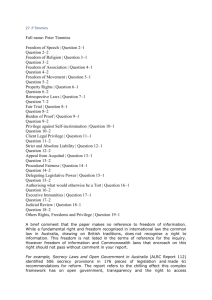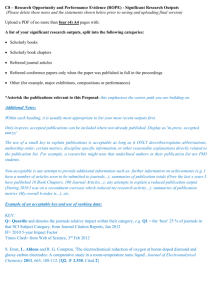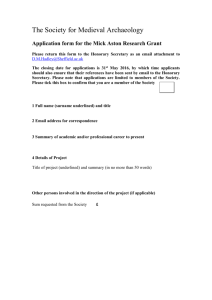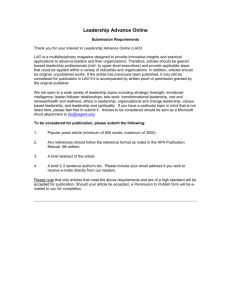Law Society of Ireland
advertisement
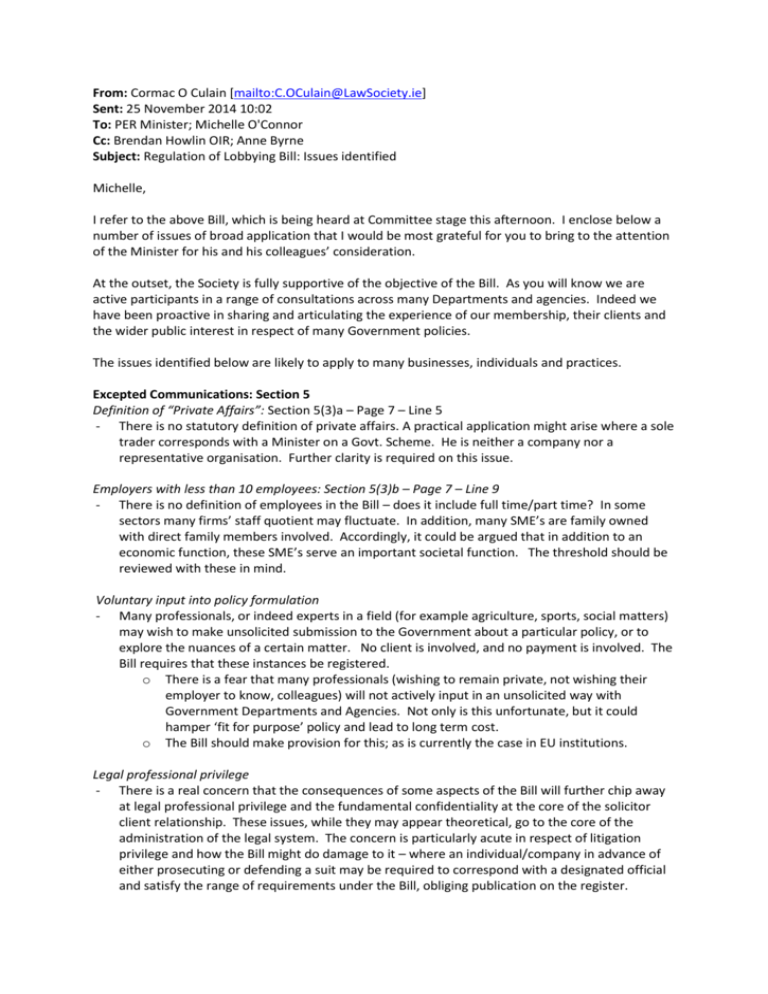
From: Cormac O Culain [mailto:C.OCulain@LawSociety.ie] Sent: 25 November 2014 10:02 To: PER Minister; Michelle O'Connor Cc: Brendan Howlin OIR; Anne Byrne Subject: Regulation of Lobbying Bill: Issues identified Michelle, I refer to the above Bill, which is being heard at Committee stage this afternoon. I enclose below a number of issues of broad application that I would be most grateful for you to bring to the attention of the Minister for his and his colleagues’ consideration. At the outset, the Society is fully supportive of the objective of the Bill. As you will know we are active participants in a range of consultations across many Departments and agencies. Indeed we have been proactive in sharing and articulating the experience of our membership, their clients and the wider public interest in respect of many Government policies. The issues identified below are likely to apply to many businesses, individuals and practices. Excepted Communications: Section 5 Definition of “Private Affairs”: Section 5(3)a – Page 7 – Line 5 - There is no statutory definition of private affairs. A practical application might arise where a sole trader corresponds with a Minister on a Govt. Scheme. He is neither a company nor a representative organisation. Further clarity is required on this issue. Employers with less than 10 employees: Section 5(3)b – Page 7 – Line 9 - There is no definition of employees in the Bill – does it include full time/part time? In some sectors many firms’ staff quotient may fluctuate. In addition, many SME’s are family owned with direct family members involved. Accordingly, it could be argued that in addition to an economic function, these SME’s serve an important societal function. The threshold should be reviewed with these in mind. Voluntary input into policy formulation - Many professionals, or indeed experts in a field (for example agriculture, sports, social matters) may wish to make unsolicited submission to the Government about a particular policy, or to explore the nuances of a certain matter. No client is involved, and no payment is involved. The Bill requires that these instances be registered. o There is a fear that many professionals (wishing to remain private, not wishing their employer to know, colleagues) will not actively input in an unsolicited way with Government Departments and Agencies. Not only is this unfortunate, but it could hamper ‘fit for purpose’ policy and lead to long term cost. o The Bill should make provision for this; as is currently the case in EU institutions. Legal professional privilege - There is a real concern that the consequences of some aspects of the Bill will further chip away at legal professional privilege and the fundamental confidentiality at the core of the solicitor client relationship. These issues, while they may appear theoretical, go to the core of the administration of the legal system. The concern is particularly acute in respect of litigation privilege and how the Bill might do damage to it – where an individual/company in advance of either prosecuting or defending a suit may be required to correspond with a designated official and satisfy the range of requirements under the Bill, obliging publication on the register. o o o The disclosure of the existence (and the extent) of the publication could in many cases have a negative impact on affairs. This, I would respectfully submit, was not intended by the Bill. Litigation privilege – and indeed legal advice privilege – is safeguarded in the UK regime and in respect of the EU institutions. In order to protect from abuse; ‘incidental’ or a threshold provision might be contemplated, such as in Australia, where lobbying activities ‘incidental’ to the main professional business are exempted. Returns to be made: Section 11 & Section 12 The requirement to make a nil return. Section 11(4) & Section 12(1) – Page 11 – Line 19 - 28 - As drafted, if a company (SME for eg) registers a lobbying activity, each year thereafter they are required to make a nil return (where they don’t make any ‘lobbying activities’). They must apply to the Commission to effectively, ‘come off’ the register. o This annual exercise of a ‘nil return’ represents an administrative burden – and therefore cost that ultimately is passed onto the consumer. o In addition, the register may become cluttered and burdensome, representing an efficiency loss, further red tape and cost to the State. o It might be more intuitive to require businesses/registered persons to make a return as they undertake each and every lobbying activity Returns to be made: Section 12 The level of information to be published on the register: Section 12(4) – Page 11 – Line 36 et seq. Section 22 of the Freedom of Information Acts empowers a Department head to ‘refuse to confirm or deny’ the existence of record. This can be done under FOI on the grounds of legal professional privilege and the duty of confidentiality that might exist between parties. This Bill operates against that; and accordingly could set the two regimes against each other o This is likely to lead to confusion, but also to undermine the FOI regime o FOI guidance explains the policy rationale behind the provision, namely ‘merely confirming the existence of information will directly or implicitly disclose sensitive information’. o It should be said also that it operates to cut across a solicitors duty of confidentiality, and legal professional privilege. Delayed Publication: Section 14 Interests of the State are not fully protected: Section 14 – Page13 – Line 24 et seq. - This Section provides for two scenarios where publication can be delayed. One is when the State’s interests are at risk. The other, when an individual/business is likely to suffer material loss etc. In relation to the former; as the Bill is written; the Commission can only delay publication when the registered person applies – ie a private party. o Surely, in order to protect the interests of the State, the Commission or a designated public official should be empowered to make that application. Period of Delay; 6 months: Section 14(5) – Line 13 - The period for delay should be on a case by case basis. It is unclear from the drafting is the period of delay capped at 6 months, with the use of the words (‘if that happens sooner’). A 6 month delay could be wholly damaging particularly where litigation may be contemplated or apprehended. o A more practical approach to the realities of business and private affairs should be considered – ie a case by case, merits of the case approach. Revoking a delayed publication : Section 14(8) – Line 20 - The provision allows the Commission to revoke a delayed publication decision; and mandates the Commission to ‘inform’ the applicant that the determination has been revoked. o The issue that arises here is that there is no consultation with the applicant prior to this decision. o Clearly if a delayed publication was granted in the first place, extenuating circumstances must have existed. To revoke it with any consultation is disproportionate. The above is a quick, tour de force, of our key concerns; which if left unaddressed may operate against the integrity and credibility of a system the Society is supportive of. Once our submission is finalised, I will bring it to your attention. My mobile is 085 720 52 53 should you wish to clarify any of the points outlined above. Regards, Cormac CORMAC Ó CULÁIN | Solicitor | Public Affairs Law Society of Ireland, Blackhall Place, Dublin 7 (DX 79 Dublin), Ireland Direct Tel: +353 (0) 1 672 4917 | Email: c.oculain@lawsociety.ie | Web: www.lawsociety.ie
